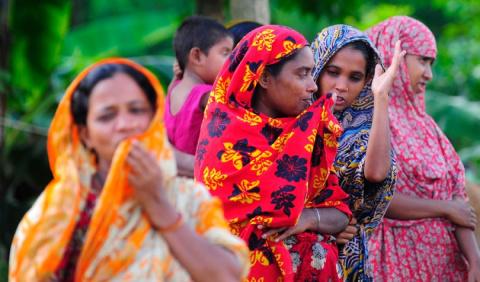Строка навигации

Committee on the Elimination of Discrimination against Women Closes Ninetieth Session in Geneva
The Committee on the Elimination of Discrimination against Women today closed its ninetieth session after adopting concluding observations on the reports of Belarus, Belize, Congo, Liechtenstein, Luxembourg, Nepal and Sri Lanka, and on the exceptional report of the Democratic Republic of the Congo on conflict-related sexual violence in its eastern provinces.
The concluding observations adopted by the Committee on the countries under review will soon be available on the session’s webpage.
In concluding remarks, Committee Chairperson Nahla Haidar said that during the challenging ninetieth session, in addition to holding dialogues with States parties, the Committee had held informal meetings with non-governmental organizations from most of the State parties reviewed and with four national human rights institutions. It was grateful to these organizations and to United Nations entities for providing it with detailed information.
Ms. Haidar said the highlight of the session was the half-day of general discussion on gender stereotypes on 17 February, which was attended by 46 States parties and 17 non-governmental organizations. The discussions highlighted the fact that gender stereotypes were underlying causes of gender-based violence against women and posed significant barriers to women’s access to political life, education, employment and leadership positions. They marked a crucial step in developing a general recommendation to guide States parties on eliminating stereotypes.
During the session, Ms. Haidar said, the Committee made important progress in rationalising and harmonising its working methods with those of other treaty bodies, including through changes to rationalise working groups, increase the number of lists of issues prior to reporting to be adopted over the coming two years, and to systematically raise male succession to the throne in dialogues and concluding observations, where relevant.
Ms. Haidar welcomed the progress achieved by the Working Group on gender-based violence against women on its draft working paper on online and tech-facilitated gender-based violence against women. She also commended the convening of an illustrious group of experts and private sector representatives to discuss best practices in digital innovation and mitigation of gender gaps during the Committee’s public meeting with the Working Group on business and human rights, and further welcomed the endorsement of the Committee’s contribution to the 2025 High-Level Political Forum on Sustainable Development.
Ms. Haidar said the Committee had adopted five follow-up assessments and prepared four final decisions on individual communications. It also adopted the report of Inquiry 2014/2 concerning large-scale abductions of women and girls by insurgents and other armed groups, which would be published after the expiry of the six-month period for the State party concerned to submit observations.
During the session, Ms. Haidar said, the Committee also held informal meetings with the United Nations Special Rapporteur on climate change, the Committee on the Rights of the Child, the Committee on Economic, Social and Cultural Rights and the World Health Organization.
In closing, Ms. Haidar thanked all those who contributed to the session, including new Committee Experts Hamida Al-Shukairi (Oman), Violet Eudine Barriteau (Barbados), Nada Moustafa Fathi Draz (Egypt), Mu Hong (China), Madina Jarbussynova (Kazakhstan), Jelena Pia-Comella (Andorra), Erika Schläppi (Switzerland), and Patsilí Toledo Vasquez (Chile), as well as other Committee members, the Committee secretariat and United Nations staff. Though not an easy task, she said, the Committee had successfully delivered on its mandate to protect and promote women’s rights and gender equality.
At the beginning of the meeting, Committee Rapporteur Brenda Akia presented the draft report of the session, which contained the draft report of the Working Group of the Whole and the provisional agenda for the Committee’s ninety-first session. The Committee then adopted the report ad referendum.
The Committee on the Elimination of Discrimination against Women is provisionally scheduled to hold its ninety-first session from 16 June to 4 July 2025, in which it will review the reports of Afghanistan, Botswana, Chad, Mexico, Monaco, San Marino and Thailand.
In addition, from 7 to 11 April in Suva, Fiji, the Committee will hold a technical cooperation session to review the reports of Fiji, Solomon Islands and Tuvalu and engage with Pacific States that are not yet parties to the Convention.
___________
CEDAW.25.053E
Produced by the United Nations Information Service in Geneva for use of the information media; not an official record.
English and French versions of our releases are different as they are the product of two separate coverage teams that work independently.

